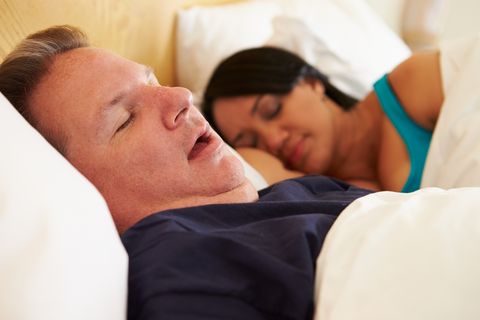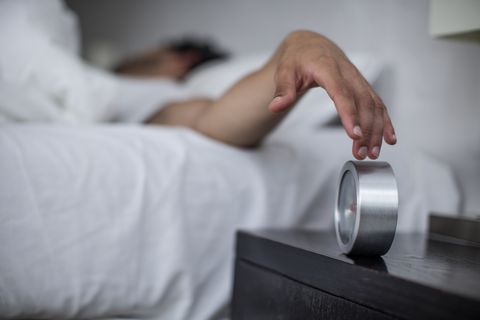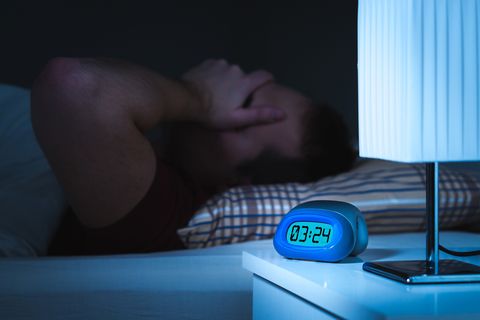

Extra body weight has been associated with many health conditions, such as heart problems and a low sperm count. But being overweight or obese can affect another crucial area of your health: your sleep habits. Many studies show that people who are overweight and obese sleep less than those with lower BMIs.
Here’s how (and why) being overweight affects your sleep habits — and what you can do to finally catch some much-needed Zs.

Westend61
You may develop sleep apnea.
According to neurologist Dr. Gregory Carter of the UT Southwestern Medical Center in Dallas, Texas, men have a one in four risk of developing sleep apnea. The condition causes people to stop breathing for up to 30 seconds at a time while they’re asleep. In extreme cases, this can happen for upwards of 60 times per hour, as MensHealth.com has previously reported. Often, guys with sleep apnea don’t even know they have it, but the symptoms include snoring, fatigue, and dry mouth.
The likelihood of developing sleep apnea increases if you have a BMI higher than 30, says Carter. (For reference, a “normal” BMI is between 18.5 and 24.9.) That’s because obese guys generally have more fat in their necks, which means they tend to have more fat lining the airways in the back of their throats. This makes the passage narrower and inhibits airflow, causing breathing problems, Carter says.
Sleep apnea can be dangerous: a 2008 study found that people who had severe sleep apnea were five times more likely to die of cardiovascular problems compared to those who did not. This is because repeatedly depriving your heart of oxygen causes lasting damage, says Carter.
If you have sleep apnea, Carter recommends losing weight or quitting smoking. If you have more severe sleep apnea, you can use a Continuous Positive Airway Pressure (CPAP) therapy device, which helps open blocked airways, according to Mayo Clinic.
Back pain.
Roughly 80 percent of Americans will have lower back pain at some point in their lives, according to the National Institute of Health. “Individuals who are carrying too much weight of course have more stress on their backs,” says Carter.
People who are obese tend to experience chronic back and joint pain, or pain that lasts longer than three months. Research by the National Sleep Foundation indicates that chronic pain sufferers often can’t find a comfortable position, so they lose about 42 minutes of sleep each night.
If you do suffer from back pain, a good mattress can help. Replacing overly soft or worn-out mattresses with a medium-firm to firm option can reduce lower back pain.

Tero Vesalainen
Acid reflux
Acid reflux occurs when stomach acids flows into your esophagus, explains the Mayo Clinic. Doctors believe it’s caused by extra stomach fat causing the muscle separating the stomach and esophagus to loosen, allowing acid into your esophagus. Smoking, drinking alcohol, and lying down within three hours of eating can trigger or exacerbate the problem.
Carter says that if you have acid reflux, the acid could creep into your esophagus up to several times per hour while you’re sleeping, which may cause you to wake up throughout the night. “That certainly disturbs sleep,” he says. Fortunately, drinking less alcohol and not eating close to bedtime can lower your chances of developing the condition.
The Solution
All of these conditions have been linked to excess weight — which means that losing weight can help you manage symptoms. This doesn’t mean you need to jump on the Keto bandwagon: you can start by making small dietary changes, such as slightly reducing portion size and eating one serving of oats a day, which are loaded with fiber to keep you full, suggests gastroenterology clinical researcher Bethany Doerfler of Northwestern’s School of Medicine.
Be sure to eat three to six servings of vegetables and three to four servings of fruit per day — and of course, cutting out processed snacks will help reduce calories.
Source: Read Full Article